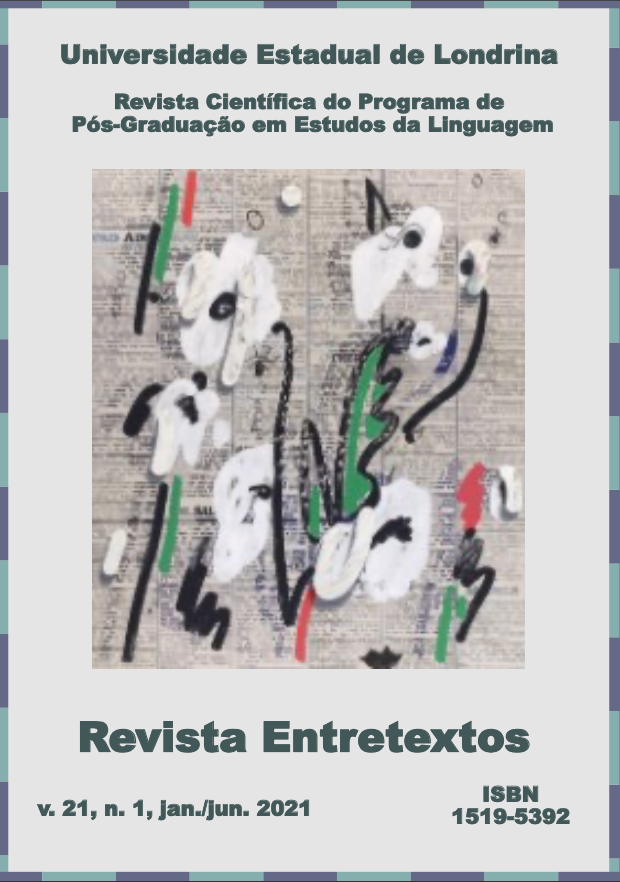Ordem e Progresso, from Deodoro da Fonseca to Michel Temer: a pathway through meaning
DOI:
https://doi.org/10.5433/1519-5392.2021v21n1p139Keywords:
Order and Progress, Discourse analysis, Brazilian Flag.Abstract
This paper aims to present an analysis of the meanings of the expression Ordem e Progresso in two moments: as a motto of the Brazilian flag and as a slogan of the Michel Temer government. This slogan was inspired by the motto of the Brazilian National Flag, which in turn was inspired by the works of the 19th century French philosopher Augusto Comte. We will analyze the text of the author of the motto, and some texts of Brazilian positivist philosophers who created the flag of the Federative Republic of Brazil under President Deodoro da Fonseca's administration. We also propose to think about the discourse of Brazilian newspapers, and how they reproduce the ideology of the ruling classes. We analyzed these texts as utterances defined by their historical moments, to understand how the motto of the Brazilian flag, when recovered in 2016, reiterates the discourse of the dominant ideology. This paper articulates some fundamental conceptions of utterance studies (BENVENISTE, 1989; DUCROT,1987) with Bakhtin and Voloshinov(1988) and Paychex's (1997) theories of discourse analysis.
Downloads
References
BAKHTIN, Mikhail Mikhailovich; VOLOSHINOV, Valentin Nikoláievitch. Marxismo e filosofia da linguagem: problemas fundamentais do método sociológico na ciência da linguagem. São Paulo: Hucitec, 1988.
BENOIT, Lelita Oliveira. Augusto Comte: fundador da física social. São Paulo: Moderna, 2002.
BENVENISTE, Émile. Problemas de lingüística geral II. Campinas: Pontes, 1989.
BOCCHINI, Bruno. Fiesp volta a defender impeachment da presidenta Dilma. Agência Brasil, São Paulo, 17 mar. 2016. Disponível em
https://agenciabrasil.ebc.com.br/politica/noticia/2016-03/fiesp-volta-defender- impeachment-da-presidenta-dilma. Acesso em: 13 abr. 2020.
CÂMARA DOS DEPUTADOS. PL 2179/2003. Altera a Lei no 5.700, de 1o de setembro de 1971, que dispõe sobre a forma e a apresentação dos Símbolos Nacionais. Substitui a expressão "Ordem e Progresso" da Bandeira Nacional pela expressão "Amor, Ordem e Progresso". Brasília: Câmara dos Deputados, 8 out. 2003. Disponível em: https://www.camara.leg.br/proposicoesWeb/fichadetramitacao?idProposicao=136692. Acesso em: 15 abr. 2020.
COMTE, Auguste. Catéchisme positiviste, ou sommaire exposition de la religion universelle en treize entretiens systématiques entre une femme et un prêtre de l'humanité. Paris: Apostolat positiviste, 1848.
COMTE, Auguste. Cours de philosophie positive: tome I. Paris: Rouen Frères (Bachelier), 1830.
COMTE, Auguste. Système de politique positive, ou traite de sociologie, instituant la religion de l'humanite: tome premier: discours preliminaire, et introduction fondamentale. Paris: Librairie Scientifique-Industrielle de L. Mathias, 1851.
COMTE, Auguste. Système de politique positive, ou traite de sociologie, instituant la religion de l'humanité: tome deuxieme: statiques sociale ou le traite abstrait de l'ordre humain. Paris: Librairie Scientifique-Industrielle de L. Mathias, 1852.
COMTE, Auguste. Système de politique positive, ou traite de sociologie, instituant la religion de l'humanite: tome quatrieme et dernier : tableau synthetique de l'avenir humain. Paris: Librairie Scientifique-Industrielle de L. Mathias, 1854.
DUCROT, Oswald. O dizer e o dito. Campinas: Pontes, 1987.
ELITES empresariais paulistas: depoimentos à FGV. Rio de Janeiro: FGV, 2011.
FIESP esclarece noticiário sobre operação da polícia federal. Portal Fiesp, São Paulo, 26 mar. 2009. Disponível em: ttps://www.fiesp.com.br/noticias/fiesp-esclarece-noticiario- sobre-operacao-da-policia-federal/. Acesso em: 14 abr. 2020.
GOMES, Laurentino. 1889: como um imperador cansado, um marechal vaidoso e um professor injustiçado contribuíram para o fim da Monarquia e a Proclamação da República no Brasil. São Paulo: Globo, 2013.
GOUHIER, Henri. La vie d'Auguste Comte. 2. ed. Paris: Librairie philosophique J. Vrin, 1965.
GOVERNO FEDERAL: ordem e progresso" será o slogan de temer. Política e poder. Jornal De Brasília, Brasília, 12 maio 2016. Disponível em: jornaldebrasilia.com.br/politica-e-poder/governo-federal-ordem-e-progresso-sera-o-slogan-de-temer. Acesso em: 15 abr. 2020.
GRANGE, Juliette. Le vocabulaire de Comte. Paris: Edité par Ellipses, 2002.
LACERDA, Gustavo Biscaia. Elementos estáticos da teoria política de Augusto Comte: as pátrias e o poder temporal. Revista de Sociologia e Política, Curitiba, n. 23, p. 63-78, 2004.
LAGARRIGUE, Juan Enrique. Segunda carta á la señora Doña Emilia Ralrdo Bazán. Santiago de Chile: Imprenta Cervantes, 1889.
MAINARDI, Diogo. Lula é minha anta. Rio de Janeiro: Record, 2007.
MARX, Karl; ENGELS, Friedrich. A ideologia alemã: crítica da mais recente filosofia alemã em seus representantes Feuerbach, B. Bauer e Stirner, e do socialismo alemão em seus diferentes profetas. São Paulo: Boitempo, 2007.
MENDES, Raymundo Teixeira. A bandeira nacional. 3. ed. Rio de Janeiro: Igreja Pozitivista do Brazil, 1958.
MOURA BRASIL, Felipe. Veja o panorama do desgoverno Dilma no fim de 2015. Site da revista Veja, São Paulo, 9 fev. 2017. Disponível em:
https://veja.abril.com.br/blog/felipe-moura-brasil/veja-o-panorama-do-desgoverno-dilma-no-fim-de-2015. Acesso em: 13 abr. 2020.
O DESGOVERNO de Dilma produziu distorções em relação ao orçamento. Rádio Jovem Pan, São Paulo, 29 out. 2015. Disponível em: https://jovempan.com.br/opiniao-jovem-pan/o-desgoverno-de-dilma-produziu-distorcoes-em-relacao-ao-orcamento.html. Acesso em: 13 abr. 2020.
PECHEUX, Michel. Semântica e discurso: uma crítica à afirmação do óbvio. Campinas: Editora da Unicamp, 1997.
VENCESLAU, Paulo; ROCHA, André Ítalo. Fiesp anuncia apoio ao impeachment de Dilma. O Estado de São Paulo, São Paulo, 14 dez. 2015. Disponível em: https://politica.estadao.com.br/noticias/geral,fiesp-declara-apoio-formal-ao-impeachment-de-dilma,10000004821. Acesso em: 14 abr. 2020.
Downloads
Published
How to Cite
Issue
Section
License
Copyright (c) 2021 Entretextos

This work is licensed under a Creative Commons Attribution 4.0 International License.
Entretextos adota a Licença Creative Commons Attribution 4.0 International, portanto, os direitos autorais relativos aos artigos publicados são do/s autor/es.
Sob essa licença é possível: Compartilhar - copiar e redistribuir o material em qualquer suporte ou formato. Adaptar - remixar, transformar, e criar a partir do material, atribuindo o devido crédito e prover um link para a licença e indicar se mudanças foram feitas.























